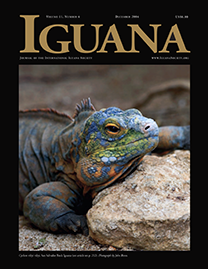Conservation Status of Spiny-tailed Iguanas (Genus Ctenosaura), with Special Emphasis on the Utila Iguana (C. bakeri)
Abstract
None of the species in the genus Ctenosaura are currently listed under the Convention on International Trade of Endangered Species of Wild Fauna and Flora (CITES). Despite their protected status by national law in México and most Central American countries, living specimens and eggs of the large species (e.g., C. acanthura, C. pectinata, and C. similis) can be found in markets or offered for sale along major roads by local people. An increasing threat to some of the smaller species is the international pet trade. Species of Ctenosaura with small geographic distributions are particularly vulnerable to these pressures, considerably more than their widely distributed congeners. The Utila Iguana (Ctenosaura bakeri), for example, is an endangered species endemic to Isla de Utila, which is located off the Caribbean coast of Honduras. To preserve the Utila Iguana in its natural environment, the “Conservation Project Utila Iguana” was founded in 1994. The main activities of the project include a broad education and information program for the local community, investigations into the biology of the species, a headstart program, and the protection of iguana habitat.

